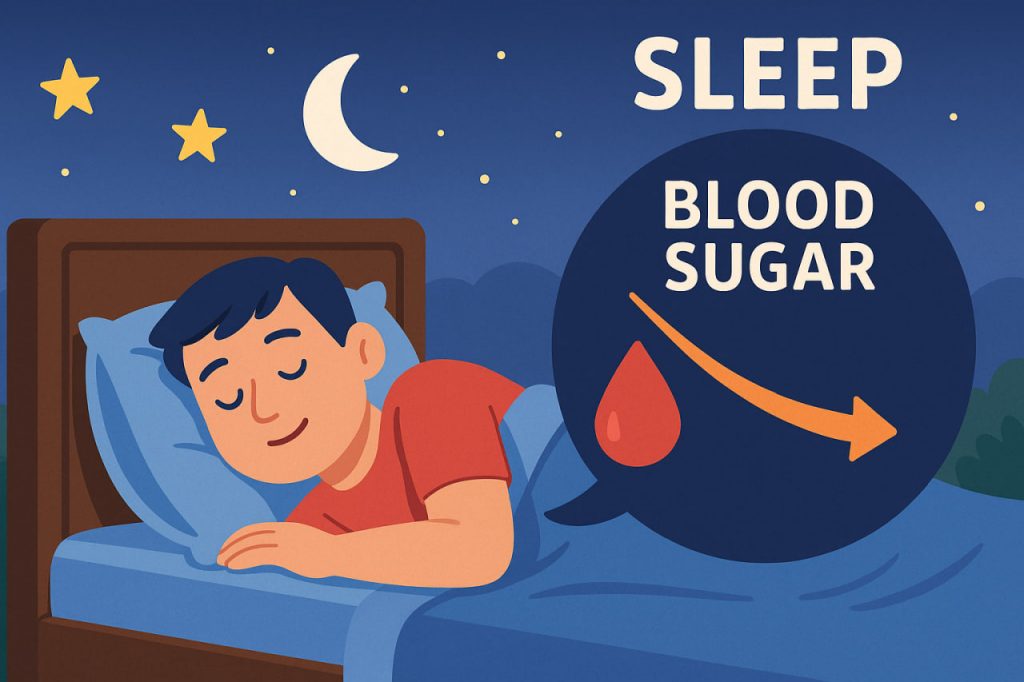Sleep is a fundamental biological process that influences nearly every system in the human body, including metabolism and blood sugar regulation. In recent years, scientists have discovered strong connections between sleep quality, sleep duration, and glucose control. Poor sleep patterns, whether caused by insomnia, irregular schedules, or sleep disorders, can significantly increase the risk of metabolic diseases such as type 2 diabetes. Understanding this relationship highlights why healthy sleep habits are essential for maintaining stable blood sugar levels and overall well-being.
How Sleep Affects Glucose Regulation
During sleep, the body undergoes processes that restore hormonal balance and repair tissues. Hormones such as insulin, which regulates blood sugar, follow natural rhythms tied to the sleep-wake cycle. When a person sleeps adequately, insulin sensitivity remains high, meaning cells can efficiently absorb glucose from the bloodstream. However, when sleep is disrupted or shortened, insulin sensitivity decreases, leading to higher blood sugar levels.
Sleep Duration and Blood Sugar
Both too little and too much sleep can negatively affect glucose metabolism. Research shows that sleeping less than 6 hours per night increases the risk of insulin resistance, while consistently exceeding 9 hours may also disrupt metabolic health. The ideal range for most adults is 7–9 hours of quality sleep, which supports stable blood sugar levels and reduces the likelihood of developing metabolic disorders.
The Role of Sleep Quality
It is not only the length of sleep that matters but also its quality. Fragmented sleep, frequent awakenings, or sleep disorders such as sleep apnea interfere with deep sleep stages, which are essential for restoring insulin function. Poor sleep quality can cause spikes in stress hormones like cortisol, which promote glucose release into the blood, further destabilizing sugar levels.
Impact of Circadian Rhythms
The body’s internal clock, or circadian rhythm, plays a key role in regulating metabolism. Irregular sleep schedules, such as those caused by night shifts or frequent travel, disrupt circadian rhythms and impair the body’s ability to process glucose efficiently. Maintaining a consistent sleep schedule helps synchronize hormonal cycles and supports healthy blood sugar regulation.
Connection to Diabetes and Long-Term Health
Chronic sleep deprivation is strongly linked to a higher risk of developing type 2 diabetes. People with irregular or insufficient sleep patterns are more likely to experience weight gain, inflammation, and insulin resistance. Over time, these changes can contribute to serious health problems, including cardiovascular disease. Healthy sleep habits, combined with balanced nutrition and physical activity, form an important part of diabetes prevention strategies.
Conclusion
Sleep is a vital factor in maintaining stable blood sugar levels and overall metabolic health. Both the duration and quality of sleep directly influence insulin sensitivity, hormone balance, and glucose regulation. By prioritizing consistent, restorative sleep, people can reduce the risk of metabolic disorders, improve daily energy, and support long-term well-being.
Glossary
- Insulin – a hormone that helps regulate blood sugar by allowing cells to absorb glucose.
- Insulin resistance – a condition in which cells do not respond properly to insulin, leading to elevated blood sugar levels.
- Glucose – a simple sugar that serves as the main energy source for the body.
- Circadian rhythm – the body’s internal 24-hour biological clock that regulates sleep, hormones, and metabolism.
- Type 2 diabetes – a chronic disease characterized by high blood sugar levels due to insulin resistance or inadequate insulin production.


